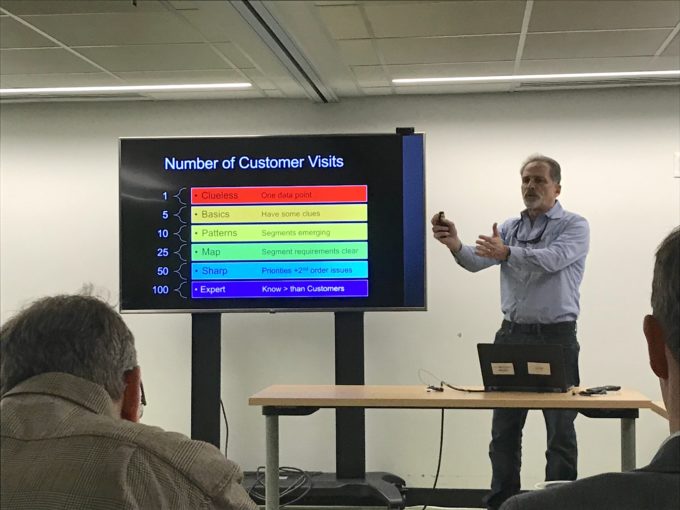Mitch Tyson’s Customer Discovery presentation is a rite of passage for Greentown Launch participants.
Greentown Labs’ internal accelerator Greentown Launch is our most comprehensive method of helping startups and corporates engage in ways that will help them both prosper. Customer discovery is crucial to this process, because if there’s no customer, there’s no business—no matter how impressive the startup’s technology is.
The Circularity Challenge, run with BASF and supported by Stanley Black & Decker, is a six-month accelerator focused on disrupting the plastics, energy storage, and recycling value chains. Startups Corumat, Nexus Fuels, Circularise, Interface Polymers, and American Battery Metals Corporation were chosen as program participants from almost 100 applicants.
Mitch is a board member of Greentown Labs, co-founder of the Northeast Clean Energy Council, a partner in the Clean Energy Venture Group, and an experienced entrepreneur.
“People don’t obey the laws of physics.”
Mitch believes entrepreneurs need to understand people even better than they understand their technology—and acknowledges that doing so can be even more challenging.
“You are asking people to change. Every customer is going to resist you.”
Here’s what separates successful companies from unsuccessful companies, according to Mitch: whether they’re solving an urgent problem, and whether they’re solving that problem effectively.
Those questions are so decisive because it’s hard to change people’s behavior. You need a compelling value proposition if you want to succeed, Mitch emphasizes—especially in cleantech industries, which are risk-averse and slow to change. He recommends searching for multiple value propositions that, combined, can move the needle.
“You need to ask your customer. You need to study your customer. You need to find your customer’s truth.”
In order to craft a compelling value proposition, you need to understand your customer, Mitch explains. That’s why he recommends spending a day with your target customers, with open ears and open eyes. What problems do they run into? Who do they work with? What are their current processes? Where is there waste or inefficiency?
“The absolute essential element is not to sell.”
Mitch recommends you speak to 100 potential customers to fully understand your market, your customers, and your value proposition. Treat them like experts—appreciatively pick their brains for information, but don’t sell until you’ve finished your entire information gathering process. Those interviews are invaluable: “They are telling you how to sell to them,” Mitch says.
“How does your product make your customer more successful?”
What does success mean to your customer, and how can you bring about that success? That’s the key information you’ll learn from spending time listening to target customers, and ultimately, that’s what you’re selling.


